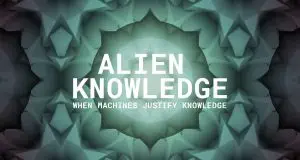
We can only know what we know because we are deeply in league with alien tools of our own devising. Our mental stuff is not enough.
A 26 minute piece by David Weinberger – Author of “Too Big Too Know” a must read for the 21st century of information and knowledge in the Digital Environment.
But today — not even a decade since Anderson’s article — the controversy sounds quaint. Advances in computer software, enabled by our newly capacious, networked hardware, are enabling computers not only to start without models — rule sets that express how the elements of a system affect one another — but to generate their own, albeit ones that may not look much like what humans would create. It’s even becoming a standard method, as any self-respecting tech company has now adopted a “machine-learning first” ethic.
We are increasingly relying on machines that derive conclusions from models that they themselves have created, models that are often beyond human comprehension, models that “think” about the world differently than we do.
But this comes with a price. This infusion of alien intelligence is bringing into question the assumptions embedded in our long Western tradition. We thought knowledge was about finding the order hidden in the chaos. We thought it was about simplifying the world. It looks like we were wrong. Knowing the world may require giving up on understanding it.
The new availability of huge amounts of data, along with the statistical tools to crunch these numbers, offers a whole new way of understanding the world. Correlation supersedes causation, and science can advance even without coherent models, unified theories, or really any mechanistic explanation at all.
[T]here are generic algorithms that can tell you something interesting about a set of data without you having to write any custom code specific to the problem. Instead of writing code, you feed data to the generic algorithm and it builds its own logic based on the data.”
[W]hat do we say about the neural networks that are enabling us to analyze the interactions of genes in two-locus genetic diseases? How about the use of neural networks to discriminate the decay pattern of single and multiple particles at the Large Hadron Collider? How the use of machine learning to help identify which of the 20 climate change models tracked by the Intergovernmental Panel on Climate Change is most accurate at any point? Such machines give us good results — for example: “Congratulations! You just found a Higgs boson!” — but we cannot follow their “reasoning.”
Information flows over and around us with all the orderliness of water cascading around boulders in a rapids. Our computers can map the cascade of interactions caused by the presence of chemicals at a cell wall, but the causal chains may be so twisty that the human brain cannot recall them or predict them.
..knowledge in the West has consisted of justifiable true beliefs — opinions we hold for a good reason.
Our new reliance on inscrutable models as the source of the justification of our beliefs puts us in an odd position. If knowledge includes the justification of our beliefs, then knowledge cannot be a class of mental content, because the justification now consists of models that exist in machines, models that human mentality cannot comprehend.
Leave a Reply